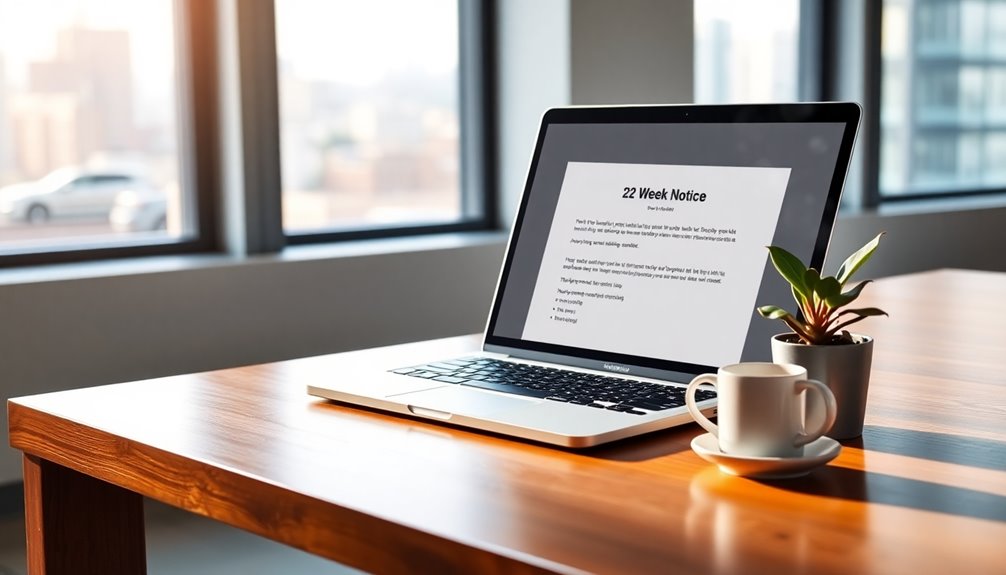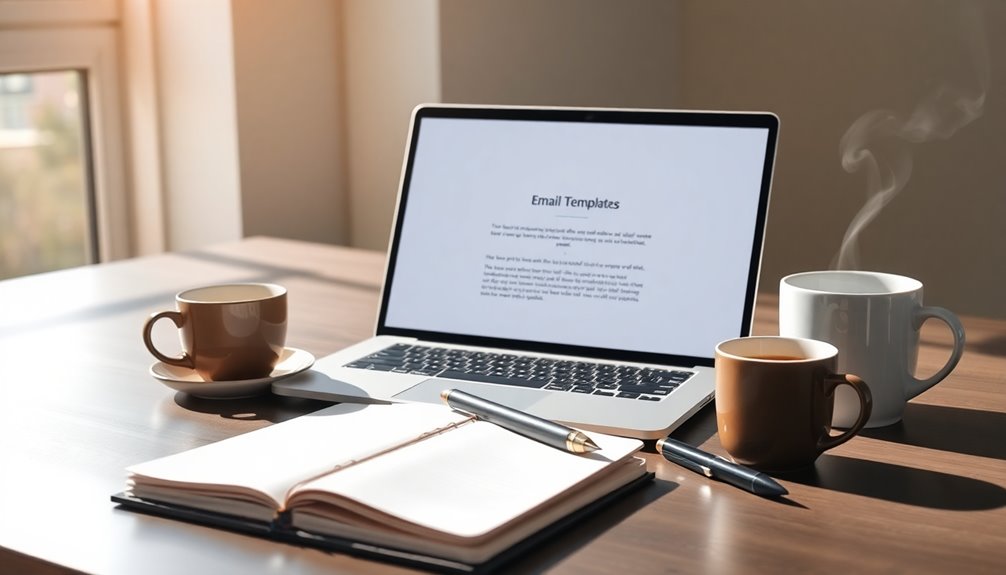To write a two-week notice email that ends on good terms, start with a professional tone. Clearly state your intention to resign and your last working day right away. Express gratitude for the opportunities you've had and the experiences gained. Keep it concise and avoid any negative remarks about the workplace or colleagues. Offer to assist during the transition, which shows your commitment to a smooth handover. Finally, consider sending farewell messages to your colleagues to maintain those relationships. You'll find more tips to craft an effective resignation email and strengthen your professional network as you continue.
Key Takeaways
- Clearly state your intention to resign and specify your last working day to ensure clarity and professionalism.
- Express gratitude for the opportunities and experiences gained during your tenure to foster goodwill.
- Offer assistance in training a replacement or helping with the transition to demonstrate commitment to a smooth handover.
- Maintain a respectful tone and avoid negative comments about the workplace or colleagues to leave a positive impression.
- Send farewell messages to colleagues to reinforce professional relationships and keep doors open for future opportunities.
Introduction
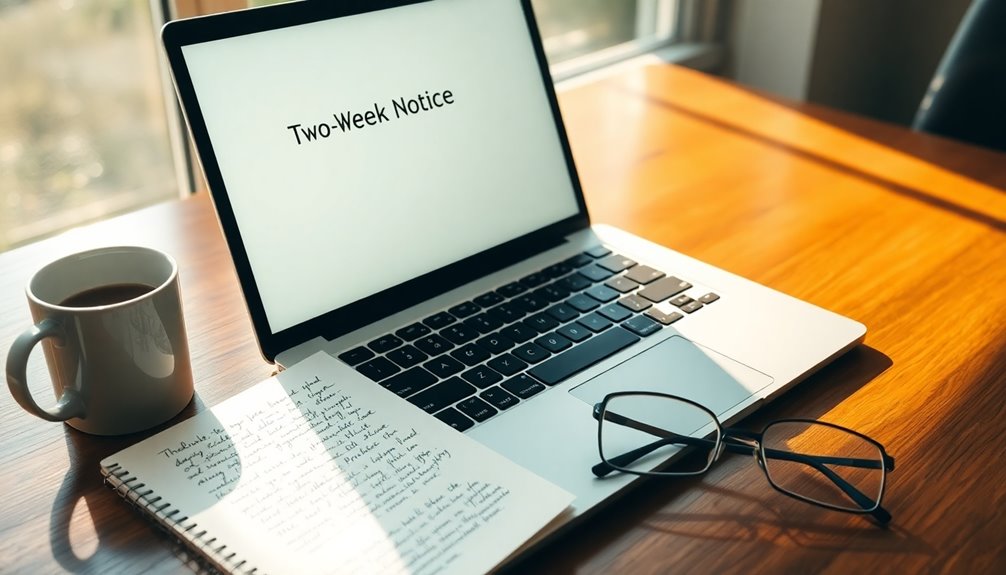
Writing a two-week notice email is an essential step when you decide to leave a job. This email serves as formal communication to inform your employer of your intention to resign. By maintaining professionalism, you demonstrate respect for your employer and colleagues, which fosters goodwill and sets the stage for positive relationships in the future.
In crafting your two-week notice email, make sure to include a clear resignation statement, specifying your last working day. This clarity helps ensure a smooth transition within the organization.
It's also important to express gratitude for the opportunities you've had during your employment, acknowledging the support and experiences you've gained.
Additionally, consider offering to assist during the transition period. You might suggest training a replacement or documenting essential processes, showing your commitment to minimizing disruption caused by your departure.
By writing your email with a polite and respectful tone, and avoiding negative language, you enhance your professional reputation. This approach can lead to better references down the line.
Maintains Professional Relationships
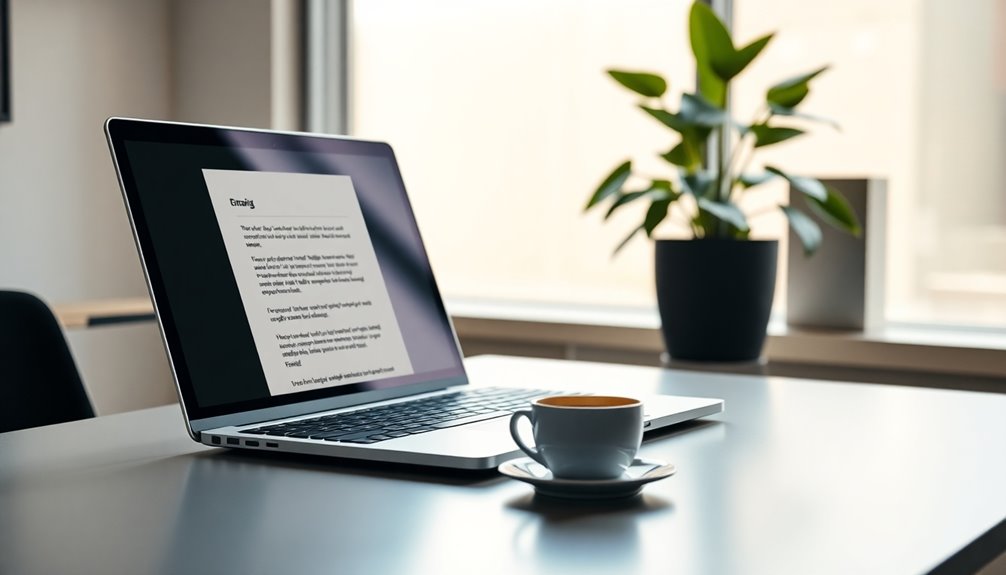
Maintaining professional relationships is vital when resigning from a job. By providing two weeks' notice, you're not only following standard protocol but also showing respect for your colleagues and supervisors.
Expressing gratitude in your resignation email leaves a positive impression, reinforcing goodwill that can benefit your career path down the line. It's essential to maintain a polite and professional tone, avoiding any negative language that could tarnish your reputation in the industry.
As you prepare for your final day, consider offering assistance during the transition. This gesture demonstrates your commitment to the team's success and helps ensure a smooth handover of your responsibilities.
A well-crafted resignation email that acknowledges your contributions and experiences can significantly enhance your chances of leaving on amicable terms. Moreover, offering constructive feedback can be valuable for your employer, showing that you genuinely care about the organization even as you depart. Additionally, supporting emotional well-being during transitions can help both you and your colleagues cope with the changes ahead.
Clear and Respectful Tone
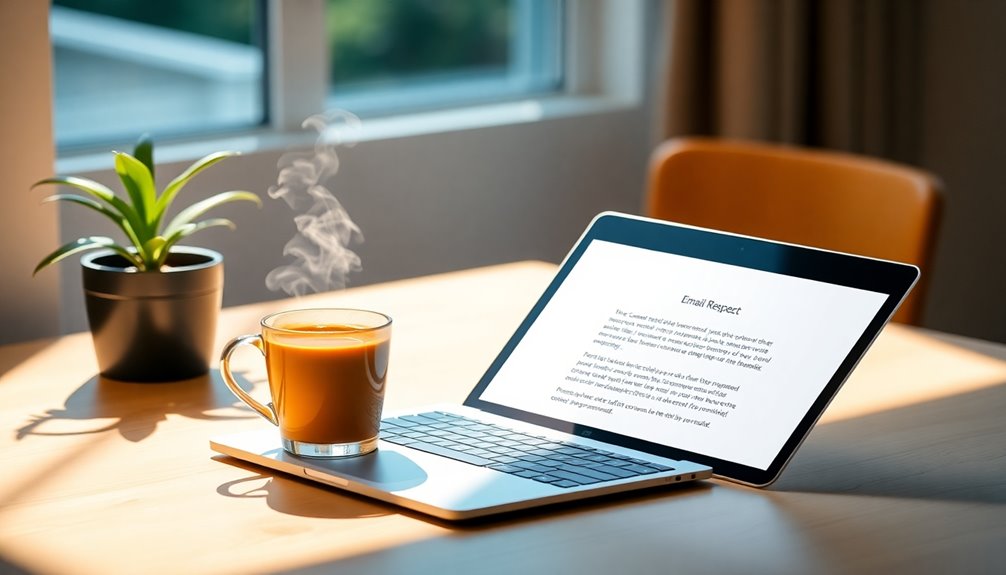
When you craft your two-week notice email, setting a clear and respectful tone is crucial for leaving a positive impression. A professional tone demonstrates maturity, helping you maintain positive relationships with colleagues and supervisors. This is key for future references and networking opportunities.
Expressing gratitude in your email reinforces that respectful tone. Acknowledge the opportunities provided during your employment, as this reflects your appreciation and leaves a lasting goodwill.
Remember, it's vital to avoid negative language or complaints. Negative remarks can tarnish your reputation and create unnecessary tension, which you want to steer clear of as you transition out of your role.
Make sure there's clarity in your message. Clearly state your intention to resign and specify your last working day to minimize any potential confusion.
By being straightforward and respectful, you not only communicate your decision but also ensure that your departure is viewed positively. This approach will help you maintain valuable relationships and uphold your professional image, which can benefit you in the long run.
Ultimately, a clear and respectful tone sets the stage for a smooth transition, paving the way for future opportunities.
Step-by-Step Guide to Resignation Emails
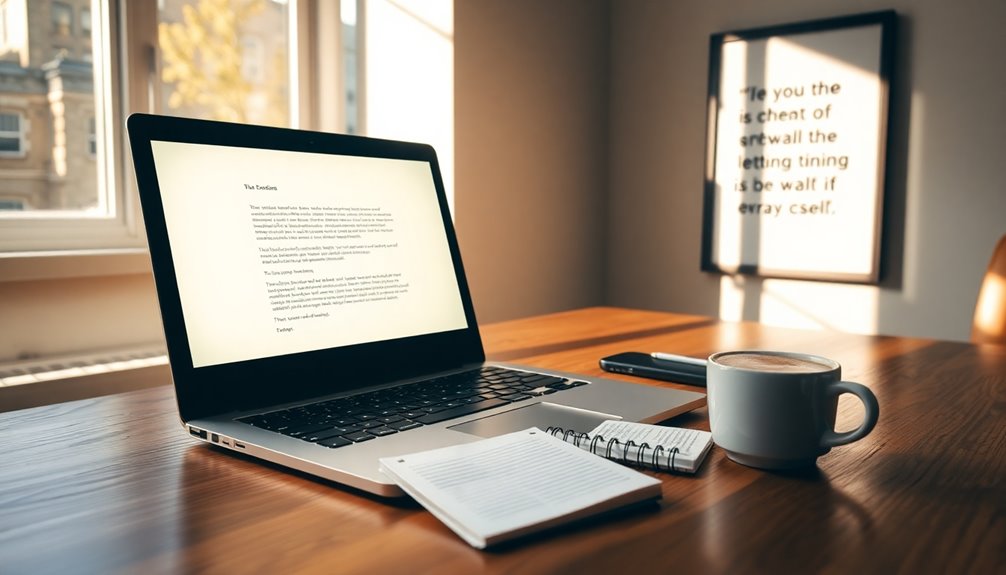
A well-structured resignation email is essential for a smooth transition out of your job. Start with a clear subject line that includes keywords like "resignation" or "two weeks notice." This ensures immediate recognition by your supervisor.
In the opening paragraph, state your intention to resign and specify your last working day, which should be at least two weeks from the date you send the email.
Next, express gratitude for the opportunities and experiences you've gained during your employment. This fosters goodwill and helps maintain positive relationships.
Continue with a polite and respectful tone throughout the email. Offer assistance during the transition period, such as training a replacement or preparing handover documents.
This demonstrates professionalism and your commitment to a smooth transition.
Dos and Don'ts for Resignation Emails

Crafting a resignation email isn't just about notifying your employer; it's also an opportunity to leave a lasting positive impression. First, clearly state your intention to resign and your last working day. This ensures there's no ambiguity and sets a professional tone.
Next, be sure to express gratitude for the opportunities and experiences you've gained during your employment. This fosters goodwill and helps maintain positive relationships.
When writing your resignation email, avoid negativity. Steer clear of complaints about the company or colleagues, as this can damage your professional reputation and future references. Instead, focus on your next steps and the positive experiences you've had.
Offering assistance during the transition period is essential. Let your employer know you're willing to help train a replacement or provide documentation. This shows your commitment to a smooth transition and reinforces a professional exit.
Lastly, keep your message concise. Don't overload your email with unnecessary details or personal grievances. A well-structured, straightforward resignation email will help you leave on good terms, ensuring that you make a positive impression as you move on to your next adventure.
Examples of Resignation Emails

Maintaining a professional tone, even if your circumstances aren't ideal, reflects well on your reputation. Acknowledging the skills and experiences you've gained during your time at the company can also contribute to a more positive farewell. End your email by wishing your colleagues and management the best, reinforcing your desire to maintain a positive relationship. A well-structured resignation email not only clarifies your intention but also leaves the door open for future connections. Additionally, expressing appreciation can foster emotional ties and ensure that your departure is remembered positively. Engaging in this respectful communication can enhance your self-worth and lead to lasting professional relationships.
Pro Tips for Writing Effective Emails

Effective communication is essential when writing any email, especially one as significant as a resignation notice. Start with a clear subject line like "Resignation – [Your Name]" to ensure your intention is understood immediately.
In your two-week notice email, greet your recipient personally and state your intention to resign in the first sentence. This approach sets a professional tone right from the beginning.
Make sure to express gratitude for the opportunities you've had, as this fosters goodwill and helps leave a positive impression. Clearly mention your last working day to avoid any ambiguity, which will aid your employer in planning for your departure.
Additionally, it's wise to offer assistance during the transition period. Whether it's training a replacement or documenting ongoing projects, showing your commitment to a smooth transition reflects professionalism.
Using a formal resignation letter format can also enhance the clarity and seriousness of your message.
Final Thoughts

When you approach your two-week notice, remember that how you leave can shape your professional future. Ending on good terms is crucial, especially since over 50% of employees seek better opportunities while maintaining relationships.
Your resignation email should reflect a professional tone, expressing gratitude for the experiences and lessons learned. This fosters goodwill and may lead to valuable networking opportunities later on. The importance of maintaining professional relationships cannot be overstated, as these connections can benefit you in unexpected ways.
Offering assistance during your transition period not only helps your employer but also leaves a positive impression of you. It shows you're committed to ensuring a smooth transition, which can result in better references down the line.
Don't forget to send farewell messages to colleagues; this solidifies professional relationships and keeps doors open for future career opportunities. Additionally, consider using visualization techniques to attract ideal career paths as you embark on your next professional chapter.
Frequently Asked Questions
How Do You Write a Nice Two Week Notice Email?
To write a nice two-week notice email, start with a clear subject line like "Two Weeks Notice."
In your opening sentence, state your intention to resign and mention your last working day, which should be two weeks from the date of the email.
Express gratitude for the experiences you've gained, and offer help during the transition.
Keep your tone polite and respectful, avoiding negativity to maintain positive relationships.
How Do You End a Two Week Notice Letter?
To end your two-week notice letter, express genuine gratitude for the experiences and opportunities you've had.
Acknowledge your team's support and contributions, showing your appreciation.
Then, include a positive statement about ensuring a smooth transition and your willingness to help during your remaining time.
Wrap it up with warm wishes for the team's future success, and sign off professionally with your full name and job title.
This leaves a lasting, positive impression.
How Do You Write a Two Week Notice on Heartfelt?
When you write a two-week notice, focus on expressing heartfelt gratitude.
Start by addressing your supervisor warmly and clearly state your resignation.
Share your appreciation for the experiences and opportunities you've had, highlighting specific memories that meant a lot to you.
Mention your last working day, and offer to help during the transition.
This shows your commitment to the team and leaves a positive impression as you move forward in your career.
Is It Okay to Give 2 Weeks Notice by Email?
Yes, it's okay to give two weeks' notice by email, especially in workplaces where digital communication is standard.
Just make sure you follow up with an in-person meeting to discuss your resignation.
Start your email with a clear subject line, state your last working day, and express gratitude for the opportunities you've had.
Always consider your company's culture, as some may prefer a more formal approach or face-to-face conversations.
